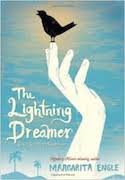
In free verse, evokes the voice of Gertrudis Gomez de Avellaneda, a book-loving writer, feminist, and abolitionist who courageously fought injustice in nineteenth-century Cuba. Includes historical notes, excerpts from her writings, biographical information, and source notes.
Join the discussion of The Lightning Dreamer as well as other books set in Cuba on our My Take/Your Take page.
- ISBN: 9780547807430
- Author: Engle, Margarita
- Published: 2013, HMH Books for Young Readers
- Themes: Literacy, slavery
- Descriptors: Cuba, Historical Fiction, Intermediate (ages 9-14)
- No. of pages: 192

Yoo Kyung:
I am a big fan of Margarita Engle. Every book of hers that I read has taught me something new in world history, but especially Cuban history. I remember being fascinated with a book Engle wrote, Tropical Secrets, Holocaust Refugees in Cuba, some years ago. The Light Dreamer, too, woke me from my ignorance of Cuban history and opened my eyes to seeing identifiable connections and familiarity with traditional and historical world views involving women and education in Korea’s past and as well as remote rural areas in Korea. In Lightning Dreamer, Engle contrasts historical slavery with the United States and Cuba, showing how pervasive Cuban slavery was from the very opening of the book. I appreciated the historical background provided because it introduced the abolitionist/poet, Gertrudis Gomez de Avellaneda. The story starts in 1827. Tula is the main protagonist; the young Gertrudis Gomez de Avellaneda. She was aware of the practiced and problematic social stigma towards women and slaves. More specifically, it prohibited education and freedom for women and slaves. Major themes in the story are about fear and oppression. Fear comes from the privileged ruling and wealthy class of men. They utilized fear by breeding insecurity in women, slaves, the poor, orphans, and even the middle class. The brother of Tula, Manuel, portrays is a member of the privileged class fearful of the power of literacy in women because of his own insecurity. The ruling class oppresses to maintain hierarchical classism and privilege protection. The reality of 1820 Cuba is well illustrated through the social role of marriage. Marriage is a powerful analogy in this story. Marriage is a family business in which values of future wives are similarly assessed as a slave’s value in the contexts of making a monetary deal. I thought that is similar to some contemporary marriage practices still existing in today’s world; a practice prevalent in ancient history. Literacy becomes the ultimate power. It can liberate the oppressed–uneducated women, slaves, the poor, and underprivileged. The main protagonist is a smart girl, Tula, who has a thirst for literacy. The slave character, Caridad, also strives to learn to read and experiences the powerful resilience of the written word. Eventually the Lightning Dreamer shows how our life of privilege today comes from battles fought by the underprivileged in history, like Tula, Caridad, and the nuns who taught them. This book is delightfully powerful!!
Michele
It was a very interesting experience to read The Lightning Dreamer following our reading of Caminar; while both are written as historical fiction narrative poems in different times and places (The Lightning Dreamer is set in Cuba in the early 1800s and Caminar in Guatemala 1980s); the biggest shift for me is the voice of the main character. Both Caminar and The Lightning Dreamer relate to serious and complex issues, yet in Caminar Carlos’ seems to speak from innocence while Tula in The Lightning Dreamer is also quite young in age, but she seems to speak with a voice of maturity and is driven beyond her personal world. Through the author’s words it is apparent that Tula’s personal turmoil and emotional anguish is somewhat driven by her battle with her mother – to choose her own marriage partner based on love rather than be forced into marriage for profit. However, Tula battles for all those who are oppressed and fights for freedom of enslavement and racial and gender equality for all. Early in the book Tula has the option to be financially rich, yet fights to free others from slavery and speaks out against marriage for profit, an unjust but accepted tradition at the time. In other words, she sacrifices her personal comforts and suffers personal tragedies for the freedoms not granted to her and others. I think it would be interesting to discuss with students – What drives one battle for others against injustice? How are these passions fueled? What makes one continue to fight? And as you astutely mention in your response, How is literacy the ultimate power? How do our life privileges come from battles from all different underprivileged in history like Tula?